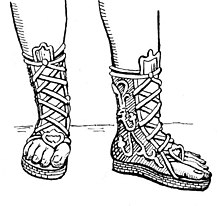Buskin

A buskin is a knee- or calf-length boot made of leather or cloth, enclosed by material, and laced, from above the toes to the top of the boot, and open across the toes.[1]
The word buskin, only recorded in English since 1503 meaning "half boot", is of unknown origin, perhaps from Old French brousequin (in modern French brodequin) or directly from its Middle Dutch model brosekin "small leather boot".
A high-heeled buskin (Greek kothornos (Greek: κόθορνος) or Latin cothurnus) was worn by Athenian tragic actors (to make them look taller).[2] Buskins therefore sometimes appear as a symbol of tragedy, often contrasted with "sock" (from Latin soccus), the low shoe worn by comedians.[3]
The buskin was also worn by hunters, and soldiers in Ancient Greek, Etruscan, and Roman societies, to protect the lower legs against thorns, dirt, etc.
Byzantine emperors were formally clad in purple buskins, embroidered in gold with double-headed eagles.[4]
References
- ^ Nunn, Joan (2000). Fashion in Costume, 1200-2000. Rowman & Littlefield. ISBN 978-1-56663-279-9.
- ^ Myers, Philip Van Ness (1898). A History of Greece: For Colleges and High Schools. Ginn & Company. p. 548. Retrieved 2 June 2024.
- ^ Bronson, Walter Cochrane (1908). English Poems: The Restoration and the eighteenth century (1660-1800). University of Chicago Press. p. 434. Retrieved 2 June 2024.
- ^ John Julius Norwich, A Short History of Byzantium, Penguin 1998, p. 248.
 This article incorporates text from a publication now in the public domain: Herbermann, Charles, ed. (1913). "Buskins". Catholic Encyclopedia. New York: Robert Appleton Company.
This article incorporates text from a publication now in the public domain: Herbermann, Charles, ed. (1913). "Buskins". Catholic Encyclopedia. New York: Robert Appleton Company.

